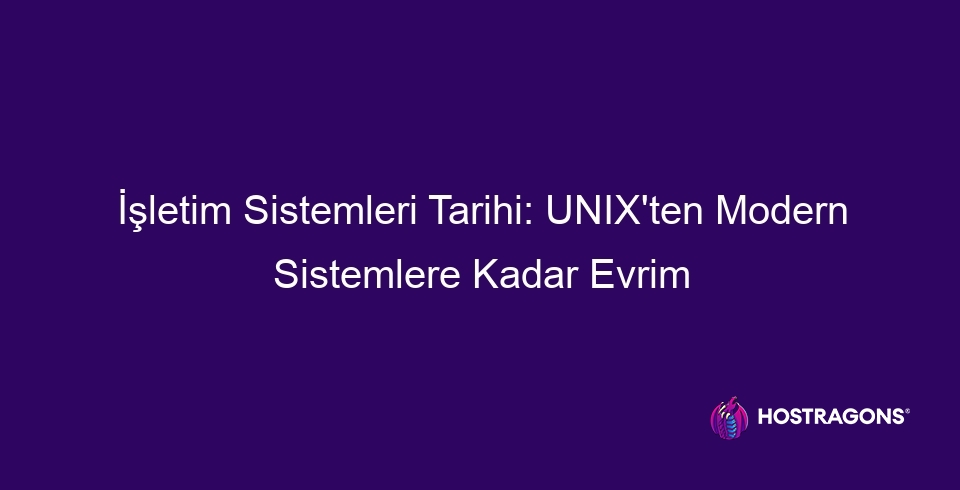Free 1-Year Domain Offer with WordPress GO Service

History of Operating Systems: Evolution from UNIX to Modern Systems
Operating Systems are the fundamental software that enables communication between a computer's hardware and the user. This blog post examines in detail the evolution of Operating Systems from UNIX to the present day. It covers a wide range of topics, from the historical development of UNIX to the different types and features of Operating Systems. It analyzes the fundamental components of modern Operating Systems, considerations when choosing a system, and the differences between them. It also evaluates innovations in next-generation Operating Systems, the importance of updates, and their advantages and disadvantages. Finally, important information is presented and recommendations are made for choosing the right Operating System. What are Operating Systems? Basic Definitions and Concepts Operating systems are the fundamental software that enables communication between a computer's hardware and the user. A computer's...
Continue reading

Best Server Operating Systems for Web Servers
This blog post examines the most suitable operating systems for web servers in detail. It begins by explaining what web servers are and why they're important, then compares the advantages and disadvantages of Windows Server and Linux servers. It addresses critical topics such as performance optimization, security measures, recommended software, backup strategies, and processor selection. The goal is to help readers make an informed decision by providing key considerations when choosing a web server. What Are Web Servers and Why Are They Important? Web servers form the foundation of websites and applications on the internet. Simply put, a web server processes web pages, images, videos, and other content that users (clients) request through their browsers.
Continue reading

User Space vs Kernel Space in Operating Systems
Operating systems have two primary domains: userspace and kernelspace, which provide access to system resources and security. Userspace is a limited-authority domain where applications run. Kernelspace, on the other hand, is a more privileged domain with direct access to hardware and system resources. The differences between these two domains are critical for security, performance, and system stability. This blog post examines the definitions, characteristics, differences, and relationships of these two domains in detail. It also touches on topics such as security measures, performance optimization, and current trends. A proper understanding of these two domains in operating systems ensures more efficient and secure systems. In Operating Systems...
Continue reading

Operating Systems Security Updates: Importance and Management
Operating systems security updates are our first line of defense against cyber threats. This blog post details why operating systems security updates are critical, common threats encountered, and how to manage these updates effectively. Discover the benefits of tracking monthly updates, updating regularly, and creating a comprehensive update schedule. We also touch on the update tools you can use for operating systems and important recommendations from cybersecurity experts. Find out how to best protect your systems by determining the ideal level of update frequency. Finally, the importance of security updates and the lessons to be learned in this area are emphasized. Why Are Operating Systems Security Updates Important? Nowadays, cyber...
Continue reading

Interrupt Mechanism and DMA in Operating Systems
In Operating Systems, the interrupt mechanism and DMA are critical elements that directly affect system performance. This blog post explores these two important topics in Operating Systems in detail. From the basic working principles of the cutting mechanism to what DMA is and how it works, you will find answers to many questions. The differences between cutting and DMA, their uses, advantages and disadvantages are presented comparatively. It also includes practical information such as how to use the cutting mechanism in operating systems and best practices for DMA. In summary, this article is a guide to your understanding of the basics of cutting and DMA mechanisms and contributing to your future learning process. A Brief Introduction to the Basic Components of Operating Systems Operating Systems...
Continue reading

Performance Monitoring and Bottleneck Analysis in Operating Systems
Performance monitoring and bottleneck analysis in operating systems are critical to improving system efficiency. This blog post examines in detail what performance monitoring in operating systems is, its benefits, and the tools used. While the definition of bottlenecks, their causes, and methods for determining them are explained, important points to consider when performing bottleneck analysis are emphasized. Data collection processes and performance improvement strategies are presented, and ways to achieve success in bottleneck management in operating systems are shown. Finally, practical application recommendations are provided to guide system administrators. What is Performance Monitoring in Operating Systems? Performance monitoring in operating systems is the process of continuously evaluating a system's resource usage, response times, and overall efficiency. This process is used to identify potential...
Continue reading

Bootloader in Operating Systems: GRUB, UEFI and Windows Boot Manager
In operating systems, bootloaders play a vital role in the computer's boot process. In this blog post, we examine in detail what bootloaders are, their importance, and their functions. We compare different types of bootloaders such as GRUB, UEFI, and Windows Boot Manager, and explain their working principles. While stating the basic differences between UEFI and BIOS, we focus on the role of Windows Boot Manager in the system startup process. We also provide information about how bootloader settings are configured, why updates are important, and solutions to possible errors. We also provide information about the future and development trends of bootloader technology, while providing readers with practical advice for bootloaders and operating systems. What is a Bootloader in Operating Systems? In operating systems, the bootloader is a small...
Continue reading

Operating Systems Running on ARM Architecture: Current Status and Future
Operating systems in ARM architecture play a critical role in a wide range of applications today, from mobile devices to embedded systems. This blog post examines the importance of operating systems in ARM architecture, popular examples, and the advantages they offer in detail. While key advantages such as energy efficiency and cost effectiveness are discussed, the increasing role of ARM operating systems in the future is emphasized. Technological developments, areas of use, security issues, and common errors and solutions are also evaluated, and best practice recommendations are presented in ARM architecture. As a result, important information and recommendations are provided regarding the future potential of operating systems in ARM architecture. What is the Importance of Operating Systems in ARM Architecture? ARM architecture is today used in a wide range of applications from mobile devices to embedded systems, even server...
Continue reading

Operating Systems Security Hardening Guide
This blog post highlights the critical importance of operating system security and offers ways to protect against cyber threats. It provides information on a wide range of topics, from basic security principles to security vulnerabilities and solutions. While examining security hardening tools, software, and standards, the importance of operating system updates and data encryption is emphasized. Network security, control mechanisms, user education, and awareness-raising are discussed, and the steps to creating an effective security strategy are explained. This comprehensive guide contains valuable tips for anyone who wants to make their operating systems more secure. The Importance of Operating System Security In today's digital world, operating systems form the foundation of computer systems and networks. Operating systems manage hardware resources,...
Continue reading

Scheduled Tasks in Operating Systems: Cron, Task Scheduler and Launchd
Scheduled tasks in operating systems increase efficiency by enabling systems to run automatically. This blog post focuses on how these tasks are managed in operating systems. Tools such as Cron, Task Scheduler (Windows), and Launchd (macOS) are examined, and the working principles and areas of use of each are detailed. Problems and security issues encountered in scheduled tasks are discussed, and their effects on device performance are also evaluated. Different task scheduling tools are compared, and best practices and problem-solving methods are presented. The importance and statistics of scheduled tasks are emphasized, along with future expectations. The Importance of Scheduled Tasks in Operating Systems Scheduled tasks in operating systems are critical tools that enable systems to perform certain operations regularly and automatically. These tasks,...
Continue reading

